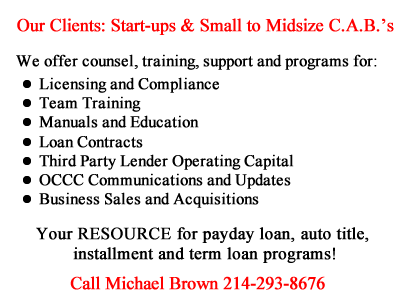Glossary
ACH: Abbreviation for Automated Clearing House. Many operators use ACH to automatically withdraw funds via an electronic debit to a customer’s bank account.
Alliance: A loose partnership with an independent operator, company, or other entity. No formal connection exists, but they commonly collaborate on endeavors, utilizing exclusive strengths to build a better concept.
Bad Debt: The percentage of a business’s loan portfolio that goes into default. Typically calculated monthly by dividing the total principal that defaults by the total fee income received for that month.
CAB: Short abbreviation for Credit Access Business. This is the official license type for businesses in Texas offering payday and auto title loans. This designation became effective January 1, 2012, under updated regulations.
Compliance: The practice of properly implementing procedures, documentation, and operational standards as required by Federal or State Law, rules, and codes.
Credit Access Business: The official license type for businesses in Texas that wish to offer payday and auto title loans. This requirement became effective January 1, 2012, replacing the CSO registration model for such businesses.
Credit Service Organization (CSO): Prior to January 1, 2012, a registration with the Texas Secretary of State was the only requirement for businesses offering payday and auto title loans in Texas. The registration required a $100 fee and a surety bond, if applicable.
CSO: Short abbreviation for Credit Service Organization. This is the old designation for Texas payday and auto title loan businesses prior to January 1, 2012, before CAB licensing was mandated.
OCCC: Abbreviation for the Office of Consumer Credit Commissioner in Texas. Often referred to as the “O-Triple-C,” the OCCC is responsible for issuing licenses for Credit Access Businesses and other regulated financial services.
Office of Consumer Credit Commissioner: Commonly called the OCCC or “O-Triple-C.” This agency in Texas issues licenses for Credit Access Business, Motor Vehicle Sales Finance, Pawn, Regulated Loan, Property Tax, and Commercial Motor Vehicle services.
Pay-down: Occurs when a customer pays the interest and fees due, along with an additional amount of principal, but does not pay off the loan in full. This action is between a rollover and a pay-off.
Pay-off: When a customer repays their loan in full as originally agreed in the loan terms.
Repo: Slang term for repossession, which refers to taking back a vehicle used as collateral for an auto title loan due to default or non-payment.
Rollover: A term in the payday loan industry referring to when a customer elects to pay only the interest and fees due instead of repaying the full loan. The loan is extended or “rolled over” to a new due date, often the customer’s next payday. Also referred to as a “refinance” or “extension.”
Annual Percentage Rate (APR): The annual rate charged for borrowing, expressed as a percentage of the loan amount. It includes interest and any associated fees, providing a comprehensive view of the loan’s cost.
Collateral: An asset pledged by a borrower to secure a loan. If the borrower defaults, the lender has the right to seize the collateral to recover the owed amount.
Default: The failure to repay a loan according to the agreed terms. Defaulting can lead to legal action and negatively impact the borrower’s credit score.
Delinquency: A situation where a borrower misses a scheduled loan payment. Extended delinquency can lead to default and additional penalties.
Finance Charge: The total cost of borrowing, including interest and any additional fees, over the life of the loan.
Grace Period: A set time after the payment due date during which a borrower can make a payment without incurring late fees or penalties.
Installment Loan: A loan repaid over time with a set number of scheduled payments. Common examples include auto loans and mortgages.
Lien: A legal right or interest that a lender has in the borrower’s property, granted until the debt obligation is satisfied.
Loan-to-Value (LTV) Ratio: A financial term used by lenders to express the ratio of a loan to the value of an asset purchased. It is calculated by dividing the loan amount by the appraised value of the asset.
Principal: The original sum of money borrowed in a loan, excluding interest and fees.
Secured Loan: A loan backed by collateral to reduce the risk associated with lending. If the borrower defaults, the lender can claim the collateral.
Term: The duration over which a loan is scheduled to be repaid. Terms can vary based on the type of loan and lender policies.
Title Loan: A type of secured loan where the borrower uses their vehicle title as collateral. If the borrower defaults, the lender can repossess the vehicle.
Truth in Lending Act (TILA): A federal law designed to promote informed use of consumer credit by requiring disclosures about terms and costs.
Usury Law: Regulations governing the maximum interest rates that can be charged on loans, varying by state.
